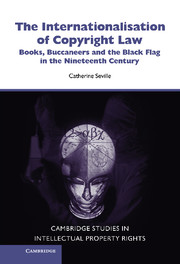 The Internationalisation of Copyright Law
The Internationalisation of Copyright Law Published online by Cambridge University Press: 25 July 2009
International copyright: gazing into cyberspace
This book is primarily concerned with the history of international copyright law. It also asserts that this history is of present relevance. Copyright law's function is to regulate the copying of copyright works. Technological developments have been instrumental in shaping its development in the past. Copying technology is better, cheaper, and more widely accessible than ever before. The prospect of endless, effortless digital copies poses a significant challenge to copyright law. The copyright industries' comfortable distribution mechanisms have been severely tested by the new digital methods of delivery. Affected groups look to copyright law for wider coverage and rigorous sanctions against infringers. Users protest that they are denied reasonable access to copyright works, as the public domain disappears into private hands. Some commentators complain that copyright protection has burgeoned wildly, far beyond its original boundaries. Some have questioned whether copyright can survive the digital age, at least in anything remotely resembling its present form. However, these trials do not necessarily foreshadow copyright's apocalypse, although they ought to trigger a considered reappraisal of its aims and policies. Viewed from a historical perspective, many of these ‘new’ challenges may be seen simply as fresh presentations of familiar dilemmas which copyright law has attempted to address in the past. Whether successful or unsuccessful, previous strategies offer valuable precedents for approaching contemporary problems. Until these have been considered, it is premature to abandon existing mechanisms.
To save this book to your Kindle, first ensure [email protected] is added to your Approved Personal Document E-mail List under your Personal Document Settings on the Manage Your Content and Devices page of your Amazon account. Then enter the ‘name’ part of your Kindle email address below. Find out more about saving to your Kindle.
Note you can select to save to either the @free.kindle.com or @kindle.com variations. ‘@free.kindle.com’ emails are free but can only be saved to your device when it is connected to wi-fi. ‘@kindle.com’ emails can be delivered even when you are not connected to wi-fi, but note that service fees apply.
Find out more about the Kindle Personal Document Service.
To save content items to your account, please confirm that you agree to abide by our usage policies. If this is the first time you use this feature, you will be asked to authorise Cambridge Core to connect with your account. Find out more about saving content to Dropbox.
To save content items to your account, please confirm that you agree to abide by our usage policies. If this is the first time you use this feature, you will be asked to authorise Cambridge Core to connect with your account. Find out more about saving content to Google Drive.